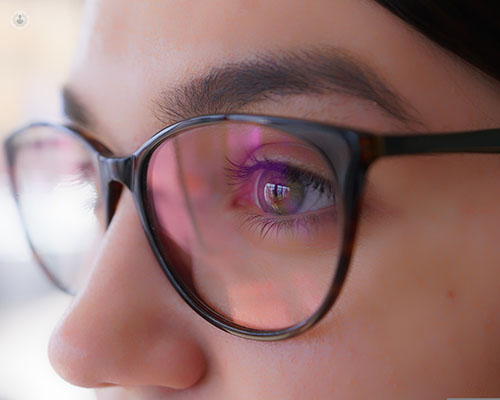Dry and wet AMD: What are the differences?
Written in association with:Dry and wet AMD are distinct conditions that require different measures and treatments to bring symptoms under control. In his latest online article, consultant orthopaedic surgeon Mr Venki Sundaram explains the differences between these conditions, and the recommended treatment or measures to take for each.

What is dry AMD?
Dry AMD constitutes 80% of cases and results from the accumulation of waste materials in the retina. This condition can gradually lead to vision impairment due to the degeneration of retinal photoreceptors.
What are the primary causes of dry AMD?
- Genetics: There is a higher prevalence among individuals with a first-degree relative affected by the disease.
- Smoking: Smokers have a 2-3 times greater risk of developing AMD.
Is there treatment available?
Currently, no treatment exists for dry AMD, but certain measures and lifestyle modifications can help slow its progression. Ongoing medical trials are exploring potential treatments to reduce the advancement of Dry AMD, including oral therapies, intraocular therapies, and stem cell therapy aimed at replacing lost retinal photoreceptors.
Recommended measures include:
- Ceasing smoking
- Consuming a balanced diet rich in natural antioxidants and leafy vegetables such as spinach
- Taking nutritional supplements (Studies like AREDS and AREDS 2 have demonstrated their effectiveness in individuals with AMD)
What is wet AMD?
Wet AMD represents only 20% of AMD cases but accounts for 80% of severe vision loss associated with AMD, making it the more serious form despite being less common.
What are the primary causes of wet AMD?
The primary cause of wet AMD is abnormal blood vessel growth beneath the retina
What are the symptoms of wet AMD?
- Rapid vision deterioration
- Image distortion
- Bleeding or fluid leakage, causing retinal damage
Is there treatment available?
The treatment landscape for Wet AMD has significantly improved with the advent of Anti-VEGF injections. This therapy has enabled many patients to continue activities such as driving, working, enjoying hobbies, and living independently.
What can happen if wet AMD is left untreated?
- A retinal scar can form in the macula, permanently impacting central vision.
Treatment outcomes
Clinical trials have shown that these treatments can maintain vision in over 90% of cases and enhance vision in over 30% of cases. Ongoing research continues to refine the best practices for sustaining the improvements achieved through early intervention.
Mr Venki Sundaram is a renowned consultant orthopaedic surgeon based in Bushey, Harpenden & Luton. If you would like to book a consultation with Mr Vats, you can do so today via his Top Doctors profile.


